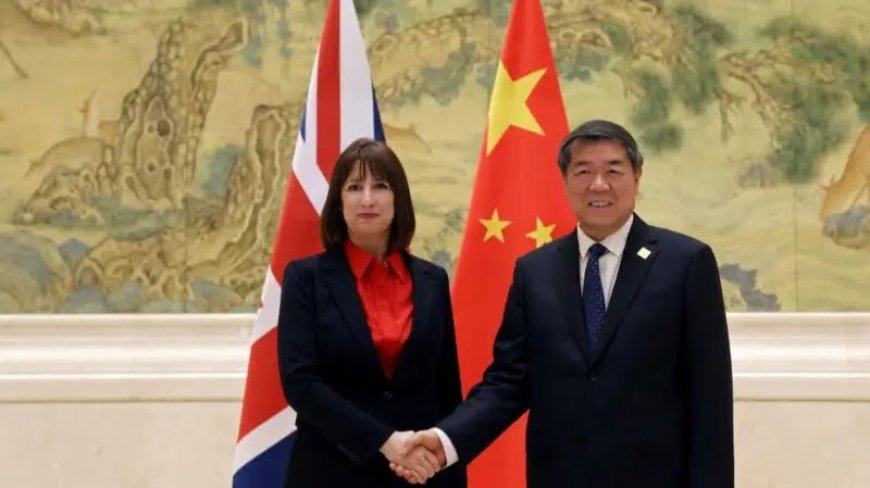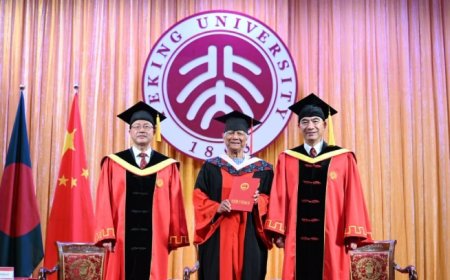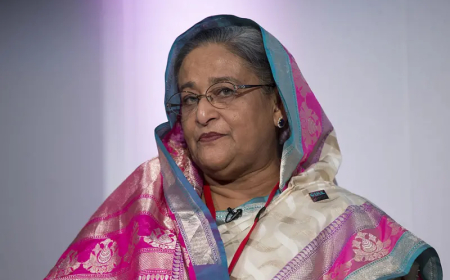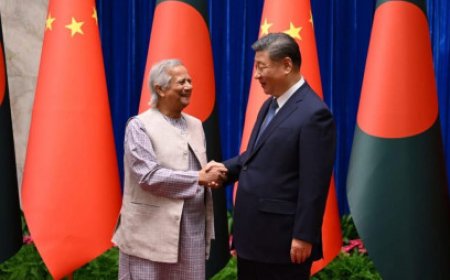Reeves defends China visit and vows to 'make UK better off'
Chancellor Rachel Reeves has defended her decision to travel to China to improve economic ties at a time when soaring government borrowing costs threaten to squeeze UK public finances.

Chancellor Rachel Reeves has defended her decision to travel to China to improve economic ties at a time when soaring government borrowing costs threaten to squeeze UK public finances.
She says she wants a long-term relationship with China that is "squarely in our national interest" in order to deliver "growth that makes working people in every corner of Britain better off".
Her trip has been overshadowed by UK borrowing costs hitting a 16-year high and a fall in the value of the pound, with the Conservatives accusing Reeves of having "fled to China".
Speaking during a visit to UK bike maker Brompton's Beijing store, Reeves insisted she would not alter her economic plans.
Chinese Vice-Premier He Lifeng in Beijing, discussing trade and investment opportunities as part of efforts to grow the UK economy and raise living standards.
China is the world's second largest economy and the UK's fourth largest single trading partner. According to the Treasury, exports to the country supported more than 455,000 UK jobs in 2020.
"Growth is the number one mission of this government," Reeves said.
"The fiscal rules laid out in the Budget are non-negotiable. Economic stability is the bedrock for economic growth and prosperity."
But the market movements create a potential problem for Reeves if she wants to meet her self-imposed fiscal rules. She has pledged not to borrow to fund day-to-day spending and to get debt falling as a share of national income by the end of this parliament.
Governments generally spend more than they raise in tax so they borrow money to fill the gap, usually by selling bonds to investors.
But UK borrowing costs have been rising in recent months and this week the cost of borrowing over 10 years hit its highest level since 2008. The pound also dropped on Friday to below $1.22.
The market turbulence also comes as growth in the UK economy has been stagnant and businesses are bracing themselves for tax rises due to come into effect in April.
Treasury said Reeves' visit to China delivered on a "commitment to explore deeper economic co-operation" between Prime Minister Sir Keir Starmer and President Xi, made last year.
But officials said the chancellor would also raise "difficult issues" with the Chinese vice-premier, which include urging China to stop its "material and economic support" for Russia's war against Ukraine, as well as raising concerns about people's rights and freedoms in Hong Kong.
"We need to make sure we have a pragmatic and good relationship with countries around the world. That is in our national interest," Reeves told reporters in Beijing.
"It's what our allies around the world do and it's what I will be pursuing as chancellor - always acting in the national interest while looking to help British businesses export overseas."
But Tory MP and former security minister Tom Tugendhat told BBC Radio 4's Today programme that the timing of Reeves' visit to China was questionable.
"She's going at a time when her Budget has sacked the economy, we've got debt rates going up, and she looks like she's going with a begging bowl, not with a trading deal," he said. "That's a real problem because actually it makes the UK look more vulnerable, and others around the world will see it too."
Tugendhat said Reeves had not made it "clear at all" what she has hoping to gain through her visit.
"We don't use the second most important person in government to do anything other than to fundamentally change a relationship," he said. "Well, she hasn't told us what that change is."
Reeves faces 'difficult decisions' on tax and spending
10 January 2025
Why are UK borrowing costs rising and what does it mean for me?
9 January 2025
Market trouble threatens Labour's economic plans
9 January 2025
Paul Johnson, director of the Institute for Fiscal Studies think tank, told BBC Radio 4's Today programme the UK had "blown hot and cold" in its relations with China over recent decades, suggesting the Chinese government might be "pretty sceptical" about British policies towards it.
On the chancellor's fiscal rules, Mr Johnson said it would be very difficult for her to abandon them.
He said: "She's really nailed her colours to the mast there and we have seen that the markets are pretty concerned about the UK position. That is partly because we are so dependent on international flows of finance to finance our debt and trade deficit."
In addition to expanding current financial services trade in Shanghai, the government has said talks would look to "bring down barriers" that British businesses face in trying to export or expand to China.
Reeves is joined by Bank of England governor Andrew Bailey, Financial Conduct Authority chief executive Nikhil Rathi and other senior representatives from some of Britain's biggest financial services firms.
But the visit also comes after MPs challenged Chinese-founded fashion retailer Shein over its supply chains amid allegations of forced labour and human rights abuses. Shein has denied the claims.
On Tuesday, a senior lawyer representing Shein repeatedly refused to say whether the company sold products containing cotton from the Xinjiang region, an area in which China has been accused of subjecting Uyghur Muslims to forced labour.
Sir Sherard Cowper-Coles, chairman of the China-British Business Council, said the chancellor was right to travel to China.
"She is doing exactly the right thing in the right way with her eyes wide open, stressing national security, stressing our [UK] values, stressing human rights," he said.
He told the Today programme: "A grown-up, confident country engages with serious players around the world, we agree to disagree, we stand up for our values."
He said the government's approach "is very similar to the last government's policy which is to compete, to challenge and to co-operate. That's what we need to do.
"China has 800 million middle-class people who want to buy British products, are interested in British savings and pension products – it's madness not to engage."






















































